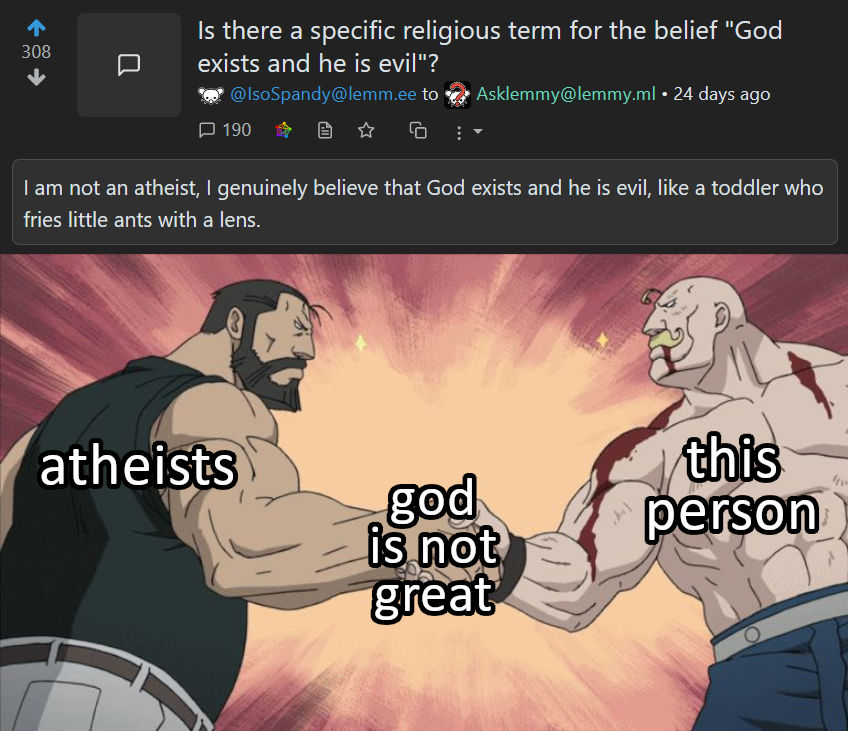this post was submitted on 01 May 2024
285 points (95.2% liked)
Atheist Memes
5574 readers
361 users here now
About
A community for the most based memes from atheists, agnostics, antitheists, and skeptics.
Rules
-
No Pro-Religious or Anti-Atheist Content.
-
No Unrelated Content. All posts must be memes related to the topic of atheism and/or religion.
-
No bigotry.
-
Attack ideas not people.
-
Spammers and trolls will be instantly banned no exceptions.
-
No False Reporting
-
NSFW posts must be marked as such.
Resources
International Suicide Hotlines
Non Religious Organizations
Freedom From Religion Foundation
Ex-theist Communities
Other Similar Communities
!religiouscringe@midwest.social
founded 1 year ago
MODERATORS
you are viewing a single comment's thread
view the rest of the comments
view the rest of the comments

Depends on the flavor of atheist, in my experience. I'm an atheist, but I've never argued that there is no god, because how the hell would I know that?
Some use the term "agnostic atheist" to describe this kind of atheist, but I'm of the mind that it doesn't need the qualifier "agnostic" since atheism is simply lacking a faith in any god, in contrast to antitheism, which is the active belief that there is no god. Antitheism is, ironically, a belief system rather than the lack of one.
Pedantically, agnostic atheism means that you don't assert you know there isn't a god ("I don't believe there's a god") vs gnostic atheism having a positive assertion there definitely isn't one ("There is no god", usually followed by some logical argument).
Antitheism is the position that theism should be opposed, not what you described and it's a philosophical position (which could be argued is a type of belief but that's straying from the topic).
Yes it is fully possible to be an antitheistic agnostic atheist.
Perhaps my understanding of the term "antitheism" is incorrect. Though I checked Wikipedia before making my comment. Wikipedia's first paragraph says:
Given the latter definition, I think I used it appropriately. Though it's apparently a spectrum, similar to atheism/agnosticism.
I stand by my assertion that the term "atheist" doesn't need the "agnostic" qualifier to specify that a given person isn't asserting that there is no god. In my experience, people incorrectly assume all atheists are de-facto antitheists and believe, actively, that there is no god, which just isn't the case. But the additional clarification by adding "agnostic" is certainly helpful in terms of clarity; I can't argue against that.
The qualifier isn't terribly necessary most of the time. Most people don't draw a distinction between ag/nosticism because it's pretty personal generally. I consider myself agnostic given that I cannot know for sure, but ultimately, people that logic themselves into atheism (and thus are gnostic atheists) are no less valid.
That said, antitheism is distinct from the other terms and I contest the generalization that people assume atheists are antitheists, but that's gonna vary a lot by how religious a region is (the more hardcore a person is, the more they see atheism as being an attack on them). It's a bit of a bad subsetting issue. All antitheists (excluding the rare individual that believes in one or more gods and believes they should be broght down like an anime or a progression fantasy novel) are atheists, but not all atheists are antitheists.
I live in the southern USA; can't drive 5 minutes without seeing a church or two. I have on several occasions met individuals who, upon learning I was an atheist, either assumed I believed there was no god, or that I actively worshipped satan, lol. Most people around here are pretty religious so my experience is definitely skewed by that factor.
Fair. I'm in the midwest and we have our crazy, but nothing like that. I've found that, outside the nutters, it's more live and let live.
Sounds like agnosticism
Upon further reflection, I have known people who were both religious and agnostic at the same time; people who had belief/faith but admitted they couldn't possibly know the truth. I guess that does make a good argument for the additional qualification of 'agnostic atheist'. I guess I just too regularly encounter people who assume that all atheists actively believe there is no god, so I've become a bit defensive as to what the word actually means. I have acquaintances who are atheists who say "there's no god" with absolute metaphysical certainty, and erroneously consider me a like-minded person, which I have always found odd because atheism doesn't require an active belief in the absence of any higher power.
Agnostic is the opposite of gnostic. The terms have to do with whether you see evidence for the position or not.
Which is all not to be confused with capital-G Gnostic, which is a totally different thing. Unfortunately, the history of philosophy is messy that way.